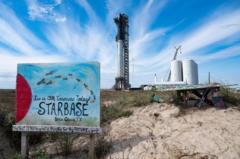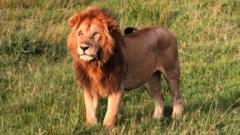**This year, humanity celebrated remarkable milestones including a historic lunar mission, the serendipitous discovery of a Mayan city, and innovative efforts to save the northern white rhino.**
**2024's Scientific Triumphs: Space Exploration, Ancient Discoveries, and Wildlife Hope**

**2024's Scientific Triumphs: Space Exploration, Ancient Discoveries, and Wildlife Hope**
**From groundbreaking astronomical achievements to significant archaeological finds, 2024 has showcased some of the most heartening scientific advances.**
In 2024, scientific innovation and discovery reached new heights, captivating worldwide audiences with extraordinary feats and heartwarming breakthroughs. Throughout the year, a series of uplifting stories emerged, ranging from space exploration advancements to significant ecological achievements.
**Milestone in Space Travel**
One of the primary highlights was Elon Musk's SpaceX successfully capturing a rocket landing with a "chopsticks" mechanism during a test flight of its Starship. This unprecedented feat marks a critical step towards reusable rockets, essential for sustainable space travel to the Moon and Mars. As SpaceX engineers celebrated this historic landing, the dream of making space travel accessible edged closer to reality.
**Mapping the Fly Brain**
In a remarkable breakthrough for neuroscience, researchers completed a comprehensive mapping of the fruit fly brain's structure, identifying over 130,000 cells and their 50 million connections. This intricate mapping provides valuable insights into the workings of even the smallest brains, paving the way for a deeper understanding of cognitive processes across species.
**Accidental Archaeological Discovery**
A serendipitous find by Tulane University’s Luke Auld-Thomas led to the discovery of a long-lost Mayan city, Valeriana, hidden beneath the jungle canopy in Mexico. Using laser technology, researchers unearthed evidence of complex urban structures that could have once housed tens of thousands of inhabitants. This archaeological treasure highlights the incredible potential of modern technology to reveal history.
**Rhino IVF Miracle**
On a promising note for conservation, scientists announced the world’s first successful IVF pregnancy in rhinos, providing hope for the critically endangered northern white rhino species. With only two individuals remaining, researchers are optimistic that the development of viable embryos could pave the way for a brighter future.
**Conservation Success Stories**
Over the years, the narrative surrounding global biodiversity loss has often been grim. However, a comprehensive review showed that conservation efforts have successfully mitigated species decline, with a two-thirds success rate across various initiatives. This research reaffirms that proactive measures can yield positive outcomes in protecting endangered wildlife.
**Captivating Cosmic Events**
2024 also witnessed a breathtaking total solar eclipse that captivated millions across North America, bridging communities in awe of the natural spectacle.
The saga of the seedlings sprouted from the cherished Sycamore Gap tree after its felling in 2023 offered further uplifting news, showcasing resilience and hope as new life emerged from the preserved seeds.
As 2024 concludes, it is evident that the blend of innovation, discovery, and conservation offers a promising outlook for our shared future on this planet.
**Milestone in Space Travel**
One of the primary highlights was Elon Musk's SpaceX successfully capturing a rocket landing with a "chopsticks" mechanism during a test flight of its Starship. This unprecedented feat marks a critical step towards reusable rockets, essential for sustainable space travel to the Moon and Mars. As SpaceX engineers celebrated this historic landing, the dream of making space travel accessible edged closer to reality.
**Mapping the Fly Brain**
In a remarkable breakthrough for neuroscience, researchers completed a comprehensive mapping of the fruit fly brain's structure, identifying over 130,000 cells and their 50 million connections. This intricate mapping provides valuable insights into the workings of even the smallest brains, paving the way for a deeper understanding of cognitive processes across species.
**Accidental Archaeological Discovery**
A serendipitous find by Tulane University’s Luke Auld-Thomas led to the discovery of a long-lost Mayan city, Valeriana, hidden beneath the jungle canopy in Mexico. Using laser technology, researchers unearthed evidence of complex urban structures that could have once housed tens of thousands of inhabitants. This archaeological treasure highlights the incredible potential of modern technology to reveal history.
**Rhino IVF Miracle**
On a promising note for conservation, scientists announced the world’s first successful IVF pregnancy in rhinos, providing hope for the critically endangered northern white rhino species. With only two individuals remaining, researchers are optimistic that the development of viable embryos could pave the way for a brighter future.
**Conservation Success Stories**
Over the years, the narrative surrounding global biodiversity loss has often been grim. However, a comprehensive review showed that conservation efforts have successfully mitigated species decline, with a two-thirds success rate across various initiatives. This research reaffirms that proactive measures can yield positive outcomes in protecting endangered wildlife.
**Captivating Cosmic Events**
2024 also witnessed a breathtaking total solar eclipse that captivated millions across North America, bridging communities in awe of the natural spectacle.
The saga of the seedlings sprouted from the cherished Sycamore Gap tree after its felling in 2023 offered further uplifting news, showcasing resilience and hope as new life emerged from the preserved seeds.
As 2024 concludes, it is evident that the blend of innovation, discovery, and conservation offers a promising outlook for our shared future on this planet.




















